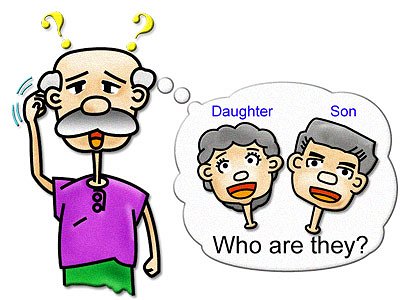Lesson 11: Cognitive Changes and Impairment
Attention

Learning Outcomes
Upon completion of this lesson's material, students will be able to:
- MHRT Outcome: Understand interaction of co-occuring medical conditions
- Identify a medical condition that could result mild cognitive impairment or delirium
- Identify over-the-counter medications that might produce periods of mild cognitive impairment or delirium
Teaching
Read Chapters 5 and 6 in Cohen & Eisdorfer
Cognitive impairment is not the inevitable consequence of aging after maturity. The mind changes but most research has focused on cognitive deficits instead of cognitive growth.
- It is important to identify how well people FUNCTION in their daily lives, not just objectively describe their cognitive abilities
- Many biopsychosocial factors impact the aging mind over the course of their lives
- The aging mind is adaptable and flexible
Intelligence
- Tends to remain stable throughout the life
- Late life terminal decline averaging 5 years before death
- Most likely associated with pre-clinical dementia
- Crystallized Intelligence vs. Fluid Intelligence
- The more a skill requires Fluid Intelligence, the earlier it begins to decline
- Selective optimization and compensation (linked to functional skills)
Sensory Motor Functioning
- Changes in sensory motor functioning may impact testing for cognitive and intellectual ability
- Vision, hearing, touch, and motor function all may decline
Memory
- Episodic Memory
- Personal experiences in the world
- Changes in Episodic memory relate to specific brain lesions
- Semantic Memory
- Overall knowledge of the world, names of objects, etc.
- Temporal lobes
- Alzheimer disease effects semantic memory separately from episodic memory
- Procedural Memory
- Ability to learn behaviors and cognitive skills
- Procedural memory may remain intact even when episodic memory and semantic memory have declined
- Working Memory
- Also known as Short Term Memory
- Any disease, including Alzheimer and other dementias, that impact the frontal lobe will impact working memory
Complaints regarding cognitive impairment may be due to situational factors (stress and anxiety), medications, or depression.
Mild Cognitive Impairment
- Subjective complaints
- Not "normal"
- May be transition to Alzheimer disease...40-80% develop Alzheimer
- No effective treatments
Dementia
- Defined as a loss of memory and other cognitive functions
- Criteria is outdated because we have a better handle on the early signs
- http://dementia.americangeriatrics.org (list of assessments and tools to diagnose Dementia
- Could be reversed if found to be associated with:
- Infections
- Nutrition
- Poisoning
- Cardiovascular and pulmonary disease
- Medications
- Visual or hearing loss
- Depression
- Isolation
Delirium
- Acute fluctuations in mental state
- Hyperactive, hypoactive, and mixed
- Inevitably associated with medical disorders and conditions
Assessment
Lesson 11 Quiz
- Identify a medical condition that could result mild cognitive impairment or delirium.
- Go to a drug store or grocery store. Locate a medication that is sold over the counter. Look up the details of the possible cognitive effects of the medication. Summarize these effects (including the description of the brain structures involved).